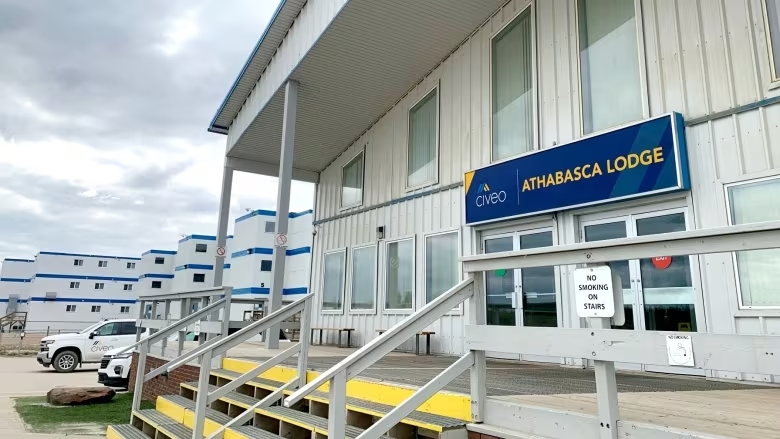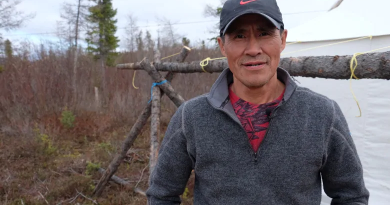Yellowknife Women’s Society calls for change after ‘chaotic’ evacuation

Open letter calls for solutions to ongoing emergency of homelessness in Yellowknife.
An organization that looks after vulnerable women is calling for change after they say many of their clients were left stranded without support during the mass evacuation out of Yellowknife in August.
The Yellowknife Women’s Society posted a detailed evacuation story on its website this week, outlining how people they were looking after fell through the cracks and ended up in cities across Western Canada with no support. They say two people even died from suspected drug overdoses in Alberta.
“[We were] receiving calls from people looking for help and support and not being able to know where to direct them,” said Zoe Share, the interim deputy director at the Yellowknife Women’s Society, told The Trailbreaker.
There was one bright spot — at a mining camp near Fort McMurray, Alta. The society was able to secure funding from the Northwest Territories Health and Social Services Authority to fly a group of high-risk clients, including those from the Spruce Bough supported living program, directly to the camp. At its peak, the camp lodged 47 underhoused people, and offered ongoing supports to clients.
The camp presented its own problems. Many of the clients are part of a managed alcohol or cannabis program, which was not initially conveyed to leaders at the camp, where alcohol and cannabis are typically not allowed. The group also had trouble getting their outreach nurse, who was licensed to work in the N.W.T., certified to treat anyone in Alberta. Another challenge was deciding who who among the most vulnerable clients would get to go.
But that paled in comparison to the challenges facing other clients who were swept up into the general evacuation.
“We made a lot of requests … to GNWT employees to try and advocate for our participants,” said Yellowknife Women’s Society board member Lindsay Debassige.
“We knew before leaving Yellowknife there was gonna be a lot of barriers and challenges for the people.” – Lindsay Debassige
Group housing needed, says society
The society repeatedly advocated for group accommodations for unhoused residents from Yellowknife in Alberta, but that didn’t happen. They also got conflicting reports about the evacuation, and experienced a lot of confusion — especially for some clients who didn’t have any identification, money, transportation options or toiletries.

“You have folks that face barriers already existing within Yellowknife. And then we put them into a larger like city where it’s a completely new environment. They’re not familiar with any of the services or resources that are available to them,” said Debassige. “And then they’re facing barriers due to their identity, because they’re Indigenous, because they experience homelessness. They maybe have, like, addictions issues. There was a lot of things that were stacked against these folks.”
It was a scary time for everyone — staff and clients alike. Some people were kicked out of hotels, and not able to access meals, so they were pushed into emergency shelters where they felt unsafe. There were even stories of people getting robbed or assaulted.
“The system definitely failed us.” – Lindsay Debassige
The society says some of their clients have yet to return north, and they’ve reported two people missing.
But Share says the evacuation did show one thing: how well things can work for people who are receiving wrap-around support based on harm reduction principles.
“It saves lives and has the potential to support so many people,” she wrote in a blog post on the society’s website.
The organization’s board has published an open letter, apologizing to clients for the “chaos” of the evacuation and the “stress and fear” it caused.
The letter also calls for better communication, more harm reduction and wrap-around support services, and a dramatic increase in supported living housing units — enough to end the ongoing emergency for people experiencing homelessness in Yellowknife.
In a statement issued to CBC North on Friday, N.W.T. senior cabinet communications advisor Jack Miltenberger said ministers are aware of the issues raised by the society.
“The content spans the mandate of many GNWT Departments, and a comprehensive discussion and examination of these issues is underway,” the statement reads.
Related stories from around the North :
Canada : Person-focused homelessness strategy tabled in N.W.T., CBC News
Norway : Unique Russian-Norwegian medical evacuation in the High Arctic, The Independent Barents Observer
United States : Craft space aims to teach Alaska Indigenous women skills — and help beat addiction, Alaska Public Media



